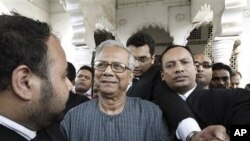In Bangladesh, the supreme court has dismissed a final attempt by microcredit pioneer Muhammad Yunus to challenge his sacking as head of Grameen Bank, which he founded three decades ago.
After a brief hearing, a seven-member bench of the supreme court dismissed two petitions seeking to overturn the sacking of Muhammad Yunus as head of Grameen Bank. The petitions had been filed by Yunus and nine directors of the bank.
Tuesday’s order ends a two-month legal battle by the Nobel laureate to save his job as head of the institution which extends tiny loans to poor people.
Age discrimination?
Yunus, 70, was dismissed for staying past the retirement age of 60. His supporters believe he was politically targeted for briefly trying to start his own political party in 2007.
The debate in Bangladesh is now moving to how the controversy will impact the work for which Yunus won international acclaim and a Nobel prize in 2006. His concept of microfinance is credited with helping millions of poor people in Bangladesh and other parts of the world.
Stability
Debapriya Bhattacharya heads the Center for Policy Dialogue in Dhaka and is a public policy analyst. He says the government must ensure that Grameen Bank’s stability is not affected. The bank has more than eight million borrowers, spread across more than 80,000 villages,
and is a significant feature of the country’s rural economy.
He says the government must also clarify its policy toward numerous other microcredit institutions which are working in the country.
"Given what has happened to the Grameen Bank’s leadership transition, it is important to note that the other microcredit operators at the field level should not feel threatened," he said. "No atmosphere of hostility should be created so that they do not feel it is not Grameen, but it is microcredit, as a whole, which is being challenged. It is very important for the government to reassure all these thousands of microcredit organizations operating in the field so that they do not feel any adverse environment. "
No worries
The government has dismissed concerns that Grameen Bank will be affected by the removal of Yunus. However, fears about the government’s attitude to microfinance institutions arose after Prime Minister Sheikh Hasina called Yunus a “blood sucker of the poor.”
In recent years, microfinance institutions have faced criticism for charging high interest rates. In neighboring India, local governments have accused some microcredit lenders of predatory practices aimed more at enriching investors than helping the poor.
But most economists say microfinance has played a useful role in poverty alleviation in one of the world’s poorest countries. They say the loans, given without collateral, also help poor people overcome crises such as illness or loss of job.




